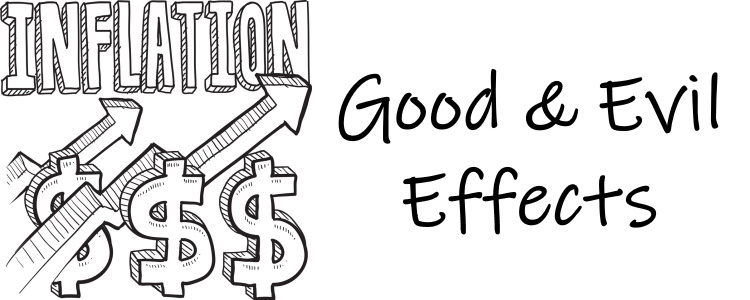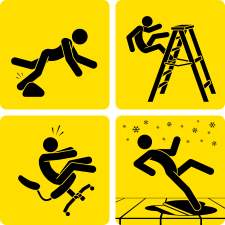Good and evil effects of Inflation on Economy
Table of Contents
- 1 Effects of Inflation
- 1.1 1. Effects of Inflation on Producers
- 1.2 2. Effects of Inflation on Working Class
- 1.3 3. Effects of Inflation on Fixed Income Groups
- 1.4 4. Effects of Inflation on Debtors and Creditors
- 1.5 5. Effects of Inflation on Distribution
- 1.6 6. Effects of Inflation on Government
- 1.7 7. Social Consequences of Inflation
- 2 Infographic on Good and Evil effects of Inflation on Economy
Effects of Inflation
Inflation has both good and evil effects on economy. In the initial stages, mild inflation may create all-round expansion of business activity and this will prove beneficial to the economy. According to Keynes,
Inflation is welcome up to the stage of full employment.
Rising prices promote, intensive business activity and a boom condition will be created. But the trouble will be, that the rise in prices will not be uniform throughout the economy and there may be distortions due to inflation causing many imbalances. We shall study the effects of inflation on different sections of the economy.

1. Effects of Inflation on Producers
Inflation is a period of boom and prosperity for the producing classes. All businessmen, traders, speculators will gain during inflation because of
- Windfall profits; and
- Appreciation in the value of their stock.
Normally, there will be time-lag between a rise in the prices of commodities and rise in the cost of production. Prices of goods increase at a faster rate during the period of inflation and the cost of production will be lagging behind as wages, interest, insurance premia, etc, are almost fixed. This will give enormous scope for windfall gain. Further, with the fall in the value of money, businessmen try to appreciate the value of their stock to the extent of fall in the value of money or even perhaps more than that. They would keep such assets as real estate, commodities, etc., whose prices will rise along the general level of price during the inflationary period. Thus, inflation is a boon in disguise to the business class at the initial stages.
2. Effects of Inflation on Working Class
Labouring classes will suffer during inflation and rise in prices, as their wages would not rise so easily and so proportionately with the increase in general price level and increased cost of living. It is said that prices go up by lift, while wages go up by steps. In modern days, there are many trade unions which react quickly to the changes in the cost of living and demand higher wages for labourers without losing time. So, the organised sections of the labouring class do not suffer much during inflation. It is only the unorganized sections of labourers, particularly agricultural labourers and self-employed people who will find it very difficult during inflation.
3. Effects of Inflation on Fixed Income Groups
The worst hit class during inflation will be the group having fixed income. Inflation will be agonizing for Pensioners, salaried class people and people who rely on their savings, fixed interest on investments, as their fixed purchasing power will dwindle in the face of mounting cost of living.
4. Effects of Inflation on Debtors and Creditors
Debtors (borrowers) gain much during the period of inflation while creditors (lenders) lose heavily. When prices rise, the real value of money will fall and the debtors will have to pay the money which will have less purchasing power. This will be beneficial to the debtor, while the creditor will be getting back the amount whose value and purchasing power has dwindled.
5. Effects of Inflation on Distribution
Inflation will have bad effects on distribution too. Since the price rise and income rise may not be uniform in all sectors and sections of the economy, there will be distortions and imbalances causing bottlenecks in distribution and fluctuations in production and effective distribution. For instance, the prices of industrial goods will go up fast during inflation and prices of agricultural produce will not become flexible that much. The returns for farmers will be dwindling. The resources will get diverted in the production of those commodities which rise up fast, as the entrepreneurs will be lured by profits. The net result will be while some class of people enjoy the benefits of inflation, some other sections of the society will be suffering.
6. Effects of Inflation on Government
The government too will be affected by inflation. The public sector undertakings may have to rise the expenditure level due to fall in the value of money, Or, they have to cut the size of the projects and programmes to meet with original budgeted expenditure. But at the same time, the government is also a beneficiary during the inflationary period. As the government will be the largest borrower, the burden of public debt will be reduced during inflation, as we have seep that debtors will gain during this period.
7. Social Consequences of Inflation
Persistent and severe inflation will have baneful influence on society. It will make rich richer and poor poorer. There will be all-round frustration among the fixed income group. The trading class will gain at the expense of salaried class. Thus, it will create lot of social tensions. Unless effective steps are taken against inflation, this will become a social menace and political problems.


